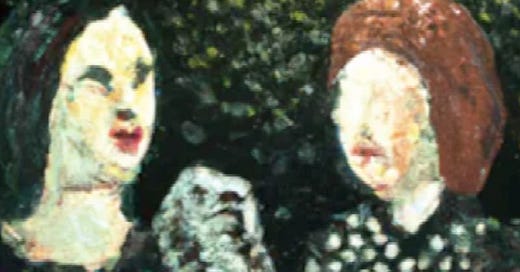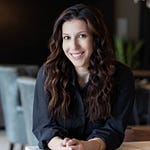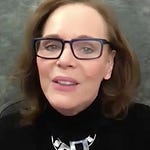Imi Lo is a consultant, psychotherapist, author on mental health, an art therapist, and trainer to therapists and coaches.
This is an excerpt from her interview with Nicole A. Tetreault, PhD, a neuroscientist, psychologist and researcher specializing in the fields of neurodiversity, giftedness, and the brain differences associated with these conditions.
See the full podcast interview on Imi Lo's site Eggshell Therapy and Coaching: Neurodivergent traits, giftedness, sensory sensitivities, sharing our personal experiences - Dr. Nicole A. Tetreault and Imi Lo.
Note - the transcript excerpt below, and the image (AI-generated in DALL-E) is from that page.
Books:
Insight Into a Bright Mind: A Neuroscientist's Personal Stories of Unique Thinking by Nicole A. Tetreault.
Emotional Sensitivity and Intensity: How to Manage Intense Emotions as a Highly Sensitive Person by Imi Lo.
The Gift of Intensity: How to Win at Life and Love as a Highly Sensitive and Emotionally Intense Person by Imi Lo.
Understanding Twice-Exceptional Learners: Connecting Research to Practice by C. Matthew Fugate, Wendy Behrens, Cecelia Boswell.
Website: nicoletetreault.com.
~~~~
Related:
See more of my Substack posts in these categories:
~~~
View selected episodes and articles with more resources: The Creative Mind Audio Podcast page on the main site.
~~~
TRANSCRIPT:
Imi Lo: Thank you for being here. You have one of the most thorough books on giftedness that I’ve ever seen. I love that you touch on … I mean there are not a lot of book out out there for gifted adults anyway, but they don’t usually touch on things in such a thorough and whole-body way.
We’ll get into it later, but it actually covers things that I’m personally a geek on, things like microbiota, holistic health. We can get into all of that later, but thank you for being here.
Nicole: Thank you so much for having me and the work that you do.
Imi Lo: I have your hard copy in the other room. I might grab it later. But in any case, let’s begin.
How would you define neurodiversity? I know people have all sorts of debates about the terms and what it should and shouldn’t include. What are some of your thoughts on that?
Nicole: Well, neurodiversity is a wide umbrella of basically individuals that have unique brain wiring and unique behaviors, and also unique ways of processing and experiencing in the world.
And so, when I think about neurodiversity, it really encompasses usually about one in five people, which is people that are on the autism spectrum, attention hyperactivity giftedness is the way that C. Matthew Fugate likes to talk about it.
I would also include giftedness in that as well, people with sensory processing and also alternative forms of speech and communication, so people on the autism spectrum as well.
When you think about that … And then in my book, I also added in mental health considerations as well because there’s often co-occurrences that happen where people with anxiety and depression actually are going to be communicating and responding to the world differently as well.
Imi Lo: One in five? That statistic shocks me. It shocks me a bit. I guess I thought it would be less. Although I mean, Elaine Aron, if you include the highly sensitive people as a part of being neurodivergent there’s one in five. Yeah. I guess because people who are usually feel like they’re such a minority.
Nicole: Well, I think that there’s different degrees. A lot of people who are gifted tend to have hypersensitivity intensities, and as well when you think about people who are on the autism spectrum or have ADHD as well, there are going to be sensory sensitivities that come along with that. And so, there’s going to be different ways that they process the world in a heightened way.
Imi Lo: I mean your book explores the experiences of people with different neurological differences. I think that’s what makes it so unique, because people don’t usually go that deep into the neurological stuff. So you’ve touched on things like ADHD, autism, and even synesthesia. I can never pronounce it right.
So I’m interested … I should probably ask that as a first question, but I know you also identify yourself as neurodivergent. Can you tell us a bit more about your own story, how you’ve come to this, and what labels, let’s say, would you categorize yourself as?
Nicole: Yeah, that’s a great question. So for me, I was really late to my identification. Actually I didn’t include dyslexia and dysgraphia in the umbrella I was talking about earlier.
Imi Lo: What is dysgraphia?
Nicole: Dysgraphia is people who have challenge with writing, or production of writing. So it may not just be a motor function, but it could be a processing function in their brain where getting words onto paper becomes challenging. So similar to somebody who has trouble speaking. And so, there could be varying degrees.
Dyslexia is really … It’s a wide range that involves differences in reading and comprehension and letter decoding. And so, for me, I wasn’t identified being dyslexic until I was in college. I took an organic chemistry class. I wanted to be an organic chemist actually and design medications because my mother had Parkinson’s disease. I was tutoring people, I knew the stuff, and I got to this exam. By the time we got to the end of the exam, I didn’t finish the last problem.
I got my exam back. I was devastated. I think I got a 53. I went to the professor and I’m like, “What’s happened? I knew all this information. I couldn’t finish the exam.” He said, “Oh, no big deal. The class average. I think, was a 50.” He’s like, “So you passed.” I said, “No, but something’s wrong.”
So then I went to the student services at UC Davis and they recommended that I get tested. Then I was tested and I had … Which was not known to me at the time. I had some areas in the 99th percentile. Then I also had discrepancies of being in the 40th percentile for visual processing. And so, they only told me that I was dyslexic. I didn’t know I was gifted at the time. But I had overcompensated my whole life.
And so, finally I was able to have notes, where I had recordings, and I had alternative forms of … I had a Spelling Ace with me at the time. We didn’t really … Because a lot of the exams were still handwritten. And so, I learned a little bit about the accommodations.
When I was applying to graduate school, that was one of my stories within a story was, well, there’s this discrepancy you see in my grades earlier on because I was not identified in getting the appropriate accommodations and services.
Imi Lo: Was it lonely? I mean did you have anyone in your life who also shared a similar experience, or were you the first one, really?
Nicole: I felt really isolated. I think that aside from that, when I start to break it out even more … I had always been a kid that I wore uniforms at school and the tags would irritate me. Somebody who would be-
Imi Lo: Yes. Oh my god, I understand that.
Nicole: Yeah. Right? I would be in the classroom and somebody would be banging their pencil. It would be very distracting. So I had a lot of these sensitivities that I didn’t really know or understand, and no one ever talked about them.
And so, yeah, I mean for me it was really lonely at times. When I studied, what made me actually a science communicator was my dyslexia, because I read everything and then I actually rewrote it in terms that I could understand by my brain, and then I was able to communicate it. That’s just how it transpired to create a profession for me in a lot of ways. So it’s a superpower, at the same time there was a lot of struggle along the way, too.
Imi Lo: Wow.
Nicole: You were saying you could resonate with tags and sensitivity of-
Imi Lo: Not just that. I really all my life had misophonia, food sensitivities, allergies, migraines, you name it, all the things you covered in your book. I guess I put that … I mean thank you for asking.
So I am personally very into things like functional medicine because, in my attempt to find answers for my own difficulties with things like headaches, sound sensitivity, I’ve tried everything and I’ve tried all the diets in the world, like vegan, paleo, keto diet. I’ve done all of it, functional medicine doctors, tapping, supplements, mountains of it. I know all about it. Microbiome, probiotics.
I really find your literature book on topics such as allergies, gut-brain connections, and gifted is really refreshing. So can you say a bit more about it, actually, dig a bit deeper into the unique wiring or the nervous system?
I mean I think most people wouldn’t even have thoughts that gifted people are more likely to have allergies. I just don’t think people think they are related, general public anyway.
Yes, at least anecdotally, I don’t know if there are research backing it up, there probably is, at least anecdotally, it is so common. So can you tell us more about are they wired differently? What’s happening in their brain?
Nicole: Yeah. So that’s a really great question. So when I started this investigation, I came in through the lens with looking at neurodiversity, and the first area I looked at was in autism. In autism, there was a lot of co-occurrences of allergies, alterations in the gut microbiome.
Imi Lo: That’s true.
Nicole: That was a little bit of a window to say, hey, something could be going on metabolically in different people with different brain wiring.
~~~
















Share this post